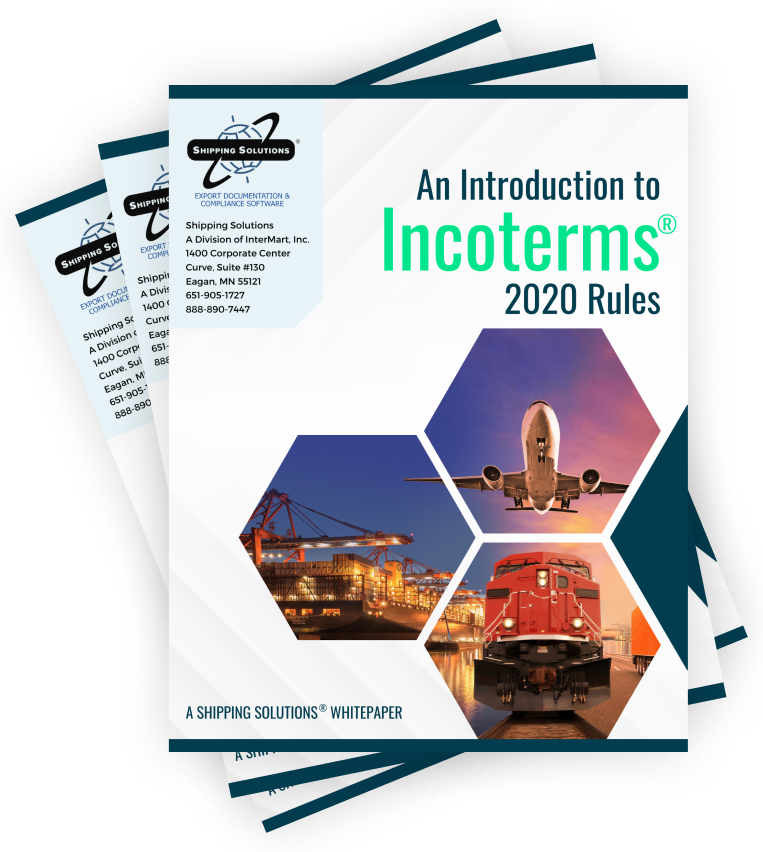The International Trade Blog International Sales & Marketing
Terms of Trade: Uniform Commercial Code and Incoterms 2020
On: March 27, 2017 | By:  Catherine J. Petersen |
6 min. read
Catherine J. Petersen |
6 min. read
 When companies negotiate a sale of goods, they typically specify the terms of the sale including when the seller transfers ownership of the goods to the buyer, who then assumes the associated risk of loss. This can occur before the buyer takes actual possession of the goods.
When companies negotiate a sale of goods, they typically specify the terms of the sale including when the seller transfers ownership of the goods to the buyer, who then assumes the associated risk of loss. This can occur before the buyer takes actual possession of the goods.
Perhaps the most familiar of these terms is FOB; however, there are several others. Such terms are also known as trade terms or mercantile symbols.
The Development of Trade Terms
These terms have been in use for hundreds of years. They were developed by traders as a shorthand way of expressing the parties’ rights and obligations with respect to the shipping or transportation of goods being bought and sold.
They were originally developed when the primary means of freight transportation was by water on the rivers and oceans of the world, long before trains, trucks and planes were in existence. Thus FOB: freight on board (a ship), or FAS: freight along side (a ship).
With the development of rail, motor, and air transportation, the terms are now also used for these modes for both domestic and international transactions.
Although there was a general consensus among traders on the meaning of the terms, a need arose to exactly and formally define the trade terms in common usage due to the explosive expansion of trade and shipping that began with the Industrial Revolution in the 19th Century. Accordingly, in the first half of the 20th Century, three organizations set about to create such definitions.
The first organization to tackle this task was the International Chamber of Commerce (ICC). The ICC first published what they called Incoterms in 1936. These were reviewed and revised in 1953, 1967, 1976, 1980, 1990, 2000, 2010 and, most recently, 2020.
Common Terms of Sale for U.S. Domestic Transactions
Most people recognize the terms of sale used for domestic transactions within the United States. Unlike the terms of sale used in international transactions, however, the domestic terms of sale are not defined in a single source or by an authoritative body. Rather, they have arisen over time through their use by business people and the transportation industry.
The most commonly used domestic terms of sale are:
- FOB Origin;
- FOB Origin, Freight Collect;
- FOB Origin, Freight Prepaid;
- FOB Origin, Freight Prepaid & Charged Back or FOB Origin, Freight Prepaid & Add;
- FOB Destination;
- FOB Destination, Freight Collect;
- FOB Destination, Freight Prepaid;
- FOB Destination, Freight Collect and Allowed.
These terms establish the contractual rights and responsibilities between a buyer and seller for delivery, risk of loss, title, and payment of freight charges. The definition of these terms, as well as a few others, derive from a combination of (1) the provisions of the Uniform Commercial Code, Article 2 (the UCC), (2) the National Motor Freight Classification (NMFC), and (3) industry usage.
These terms are commonly incorporated into companies’ operating systems, quotes, contracts and commercial invoices for domestic transactions. This is clearly appropriate since the terms are supported by decades of use, case law, and statutory law.
When it comes to international trade, however, companies using best practices will switch to Incoterms 2020 rules in quotations, purchase orders, contracts, commercial invoices, and other commercial documentation when dividing the responsibilities for risk transfer, costs and responsibility for carrier selection between the buyer and the seller.
Incoterms 2020 rules define for the seller and the buyer:
- When RISK transfers?
- Who pays which COSTS?
- Who is RESPONSIBLE for forwarder & carrier selection?
- Who prepares DOCUMENTS?
Incoterms 2020 Rules
Before you can calculate a sales price and negotiate a sales contract, you must determine what responsibilities and expenses are assigned to the seller and the buyer. This includes transporting and insuring merchandise from the time it leaves your plant or warehouse to the time it arrives at your purchaser's premises.
There is a generally accepted, readily understandable nomenclature called Incoterms 2020 that relates the trade term to the various transportation options. The trade terms do not identify where the transfer of title or ownership will occur. A separate statement regarding transfer of title should be made in the body of the contract, the quote, proforma invoice, and commercial invoice.
The international terms are defined and published by the ICC. In order to implement the use of the international terms, it is necessary to have in your sale and purchase contracts’ language such as “the terms of sale herein are based on Incoterms 2020 rules” or “governed by Incoterms 2020 rules.”
Incoterms 2020 rules provide a common reference to establish the point at which risk of loss due to loss or damage transfers from the buyer to the seller and the attendant transportation costs for which each party has responsibility. Knowledge of Incoterms 2020 rules is essential for exporters and importers to prepare contracts with terms appropriate for their customers and to make sure those contractual terms are properly fulfilled.
Incoterms 2020 rules continue the tradition of establishing a relationship between the seller and buyer regarding the location where the seller will deliver the goods into the hands of the buyer for export. Each term is followed by the appropriate location. For example, the contract for goods sold Ex Works would state “EXW [seller’s facility, city, state, country],” while the contract for goods sold Free Alongside Ship would state “FAS [named port of shipment, state, country].”
The 11 three-letter abbreviations would be used in place of domestic terms for sales outside of the United States. These 11 terms do not require the addition of a statement such as “Prepaid & Add” or “Freight Allowed” or “Freight Collect.”
As soon as a seller places the phrase “EXW Plant, Houston, TX USA - Incoterms 2020” on their quote, proforma and commercial invoice, both parties know that the inland or air or ocean freight are collect and freight forwarding fees and customs clearance at destination are for the account of the buyer. It is international shorthand defined by the ICC.
These relative responsibilities divide the costs of arranging transportation, and in some cases insurance, between the parties. It also divides the risk of loss between them. Incoterms 2020 rules are not shipping terms; instead they are part of the sales contract and help the seller and buyer define the roles and the costs that each will have in the transaction.
The choice of terms appropriate to your transaction will depend on a number of factors, such as:
- Does your buyer have facilities in the United States to take possession of the goods and arrange transportation?
- Does your company regularly receive inland freight rate discounts for truck or rail transportation to the port of loading?
- Is your buyer new to international trade without knowledge of how to arrange transportation?
It often depends on the volume of shipments that the buyer or seller controls in a year that will determine who is able to obtain a cost advantage when negotiating with air or ocean carriers or consolidators. There may not be any cost advantage for one or the other, but by utilizing a quote prepared with costs itemized by Incoterms 2020 rules, the seller and the buyer are able to make that determination.
The Incoterms® 2020 Rules Chart of Responsibilities and Transfer of Risk provides a thumbnail sketch of the terms; it is critical to the complete understanding of Incoterms to refer back to the ICC’s Incoterms® 2020 Rules publication.
Check out these articles for more information about Incoterms 2020:
For a deep dive into Incoterms 2020, watch the free 80-minute webinar, Incoterms 2020 In Practice.
Like what you read? Subscribe today to the International Trade Blog to get the latest news and tips for exporters and importers delivered to your inbox.
This post was originally published in October 2006 and has been updated to include current information, links and formatting.

About the Author: Catherine J. Petersen
In 1992, Catherine Petersen founded C J Petersen & Associates, LLC, a research, instruction and consulting firm located in St. Paul, Minnesota, USA. She has designed documentation and procedure manuals for exporters and has authored/co-authored five books.
Ms. Petersen has had day-to-day practical experience at a freight forwarder, a trading company, and an ocean carrier; she has been active in international business since 1980. Her background led her to develop C J Petersen & Associates, LLC, which is a collaborative consultancy that works with clients to identify compliance gaps and to resolve them. Ms. Petersen retired in 2022.



